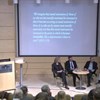zoological
For Whose Benefit? The Biological and Cultural Evolution of Human Cooperation
Springer, New York. DOI: 10.1007/978-3-319-50874-0 This book takes the reader on a journey, navigating the enigmatic aspects of cooperation; a journey that starts inside the body and continues via our
Parity and Mortality: An Examination of Different Explanatory Mechanisms Using Data on Biological and Adoptive Parents
European Journal of Population, Volume 35, Issue 1, pp 63–85. doi.org/10.1007/s10680-018-9469-1 Abstract A growing literature has demonstrated a relationship between parity and mortality, but the explana
Patrik Lindenfors: Sequences of democratization
Patrik Lindenfors, Associate Professor of Zoological Ecology. Abstract What explains successful democratization? We present a suggestion for a new solution that identifies the discrete beginning of a li

Patrik Lindenfors
I am an Associate Professor of Zoological Ecology at the Department of Zoology, Stockholm University, where I also got my PhD, but have for the last years mainly worked at the Centre for the Study of
New study deconstructs Dunbar’s number – yes, you can have more than 150 friends
An individual human can maintain stable social relationships with about 150 people. This is the proposition known as ‘Dunbar’s number’ – that the architecture of the human brain sets an upper limit on
Emergent hierarchical structures in multiadaptive games
2011. Phys. Rev. Lett. 106: 028702. We investigate a game-theoretic model of a social system where both the rules of the game and the interaction structure are shaped by the behavior of the agents. We ca
Modelling Social Mechanisms for Knowledge Generation & Exploration
Nanda Wijermans, Stockholm Resilience Centre Human behaviour is a complex phenomenon with a lot of open questions. Computational modelling can support the scientific quest for more understanding of hum
Cultural traits operating in senders are driving forces of cultural evolution
Proceedings of the royal society Biological Sciences Abstract Cultural evolution typically studies how ideas and behaviours spread and change depending on how we learn and from whom. A new model suggest

Panel discussion - The Future of Humans. Moral Bioenhancement
The greatest problems of the 21st century - climate change, terrorism, poverty and global inequality, among others – are not the result of external threat, but predominantly the result of human cho

Q&A - The Future of Humans. Moral Bioenhancement
The greatest problems of the 21st century - climate change, terrorism, poverty and global inequality, among others – are not the result of external threat, but predominantly the result of human cho








